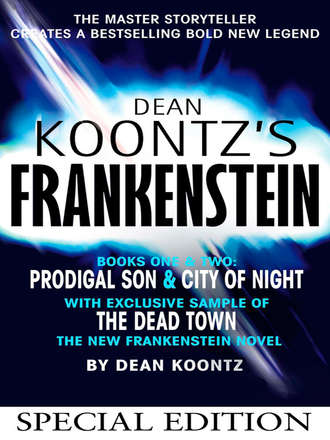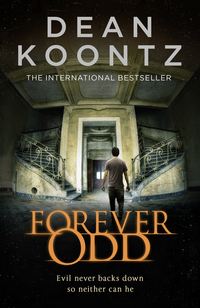
Полная версия
Frankenstein Special Edition: Prodigal Son and City of Night
He frequently ate alone. With two hundred years of experience that no one of an ordinary life span could match, he found that he was virtually always his own best company
Teasing his appetite, allowing time to anticipate the exotic entrée, he began with a simple dish: egg drop soup.
Before he had half finished this first course, his cell phone rang. He was surprised to hear the voice of the renegade.
“Murder doesn’t scare me anymore, Father.”
With a note of authority that always secured obedience, Victor said, “You must talk to me about this in person.”
“I’m not as troubled about murder as when I called you before.”
“How did you get this number?”
The emergency contact number at Hands of Mercy, given to members of the New Race, did not transfer calls to Victor’s cell phone.
Instead of answering, the renegade said, “Murder just makes me more human. They excel at murder.”
“But you’re better than their kind.” The need to discuss this, to debate it, annoyed Victor. He was master and commander. His word was law, his desire obeyed, at least among his people. “You’re more rational, more—”
“We’re not better. There’s something missing in us…something they have.”
This was an intolerable lie. This was heresy.
“The help you need,” Victor insisted impatiently, “only I am able to give.”
“If I just cut open enough of them and look inside, sooner or later I’ll discover what makes them…happier.”
“That isn’t rational. Come to me at the Hands of Mercy—”
“There’s this girl I see sometimes, she’s particularly happy. I’ll find the truth in her, the secret, the thing I’m missing.”
The renegade hung up.
As before, Victor pressed *69. Also as before, the call had come from a number that blocked automatic call-backs.
His special dinner had not been ruined by this development, but his bright mood had dimmed. He decided to switch from tea to wine.
Beer often went with Chinese food better than wine did. Victor was not, however, a beer man.
Unlike many Chinese restaurants, Quan Yin had an extensive cellar full of the finest vintages. The waiter—in a ruffled white tuxedo shirt, bow tie, and black tuxedo pants—brought a wine list.
As he finished his soup and waited for a salad of hearts of palms and peppers, Victor studied the list. He wavered between a wine suitable for pork and one better matched with seafood.
He would be eating neither pork nor seafood. The entrée, which he’d had before, was such a rare delicacy that any connoisseur of wine must be of several minds about the most compatible selection.
Finally he chose a superb Pinot Grigio and enjoyed the first glass with his salad.
Much ceremony accompanied the presentation of the main course, beginning with the chef himself, a Buddha-plump man named Lee Ling. He sprinkled red rose petals across the white tablecloth.
Two waiters appeared with an ornately engraved red-bronze tray on which stood a legged, one-quart copper pot filled with boiling oil. A Sterno burner under the pot kept the oil bubbling.
They put the tray on the table, and Victor breathed deeply of the aroma rising from the pot. This peanut oil, twice clarified, had been infused with a blend of pepper oils. The fragrance was divine.
A third waiter put a plain white plate before him. Beside the plate, red chopsticks. So gently as to avoid the slightest clink, the waiter placed a pair of stainless-steel tongs on the plate.
The handles of the tongs were rubberized to insulate against the heat that the steel would draw from the boiling oil. The pincer ends were shaped like the petals of lotus blossoms.
The pot of oil stood to Victor’s right. Now a bowl of saffron rice was placed at the head of his plate.
Lee Ling, having retreated to the kitchen, returned with the entrée, which he put to the left of Victor’s plate. The delicacy waited in a silver serving dish with a lid.
The waiters bowed and retreated. Lee Ling waited, smiling.
Victor removed the lid from the silver server. The dish had been lined with cabbage leaves briefly steamed to wilt them and make them pliable.
This rare delicacy did not appear on the menu. It was not available at all times or on short notice.
In any event, Lee Ling would prepare it only for that one-in-a-thousand customer whom he’d known for years, whom he trusted, whom he knew to be a true gourmet. The customer must also be one so familiar with regional Chinese cuisine that he knew to request this very item.
Restaurant-licensing officials would not have approved of this offering, not even here in libertine New Orleans. No health risk was involved, but some things are too exotic even for the most tolerant of people.
In the dish, nestled in the cabbage, squirmed a double litter of live baby rats, so recently born that they were still pink, hairless, and blind.
In Chinese, Victor expressed his approval and gratitude to Lee Ling. Smiling, bowing, the chef retreated, leaving his guest alone.
Perhaps the excellent wine had restored Victor’s good mood or perhaps his own extraordinary sophistication so pleased him that he could not for long remain glum. One of the secrets to leading a life full of great accomplishment was to like oneself, and Victor Helios, alias Frankenstein, liked himself more than he could express.
He dined.
CHAPTER 50
THE SECOND FLOOR of the Hands of Mercy is quiet.
Here the men and women of the New Race, fresh from the tanks, are undergoing the final stages of direct-to-brain data downloading. Soon they will be ready to go into the world and take their places among doomed humanity.
Randal Six will leave Mercy before any of them, before this night is over. He is terrified, but he is ready.
The computer maps and virtual reality tours of New Orleans have unnerved him as much as they have prepared him. But if he is to avoid the spinning rack and survive, he can wait no longer.
To make his way in the dangerous world beyond these walls, he should be armed. But he has no weapon and cannot see anything in his room that might serve as one.
If the journey is longer than he hopes, he will need provisions. He has no food in his room, only what is brought to him at mealtimes.
Somewhere in this building is a kitchen of considerable size. A pantry. There he would find the food he needs.
The prospect of searching for a kitchen, gathering food from among an overwhelming number of choices, and packing supplies is so daunting that he cannot begin. If he must provision himself, he will never leave Mercy.
So he will set out with nothing more than the clothes he wears, a fresh book of crossword puzzles, and a pen.
At the threshold between his room and the hallway, paralysis seizes him. He cannot proceed.
He knows that the floors of these two spaces are on the same plane, yet he feels certain that he will drop a killing distance if he dares cross into the corridor. What he knows is usually not as powerful as what he feels, which is the curse of his condition.
Although he reminds himself that perhaps an encounter with Arnie O’Connor is his destiny, he remains unmoved, unmoving.
His emotional weather worsens as he stands paralyzed. Agitation stirs his thoughts into confusion, like a whirl of wind sweeps autumn leaves into a colorful spiral.
He is acutely aware of how this agitation can quickly develop into a deeper disturbance, then a storm, then a tempest. He wants desperately to open the book of puzzles and put his pen to the empty boxes.
If he succumbs to the crossword desire, he will finish not one puzzle, not two, but the entire book. Night will pass. Morning will come. He will have lost forever the courage to escape.
Threshold. Hallway. With one step, he can cross the former and be in the latter. He has done this before, but this time it seems like a thousand-mile journey.
The difference, of course, is that previously he had intended to go no farther than the hallway This time, he wants the world.
Threshold, hallway.
Suddenly threshold and hallway appear in his mind as hand-inked black letters in rows of white boxes, two entries in a crossword puzzle, sharing the letter b.
When he sees the two words intersecting in this manner, he more clearly recognizes that the threshold and the hallway in reality also intersect on the same plane. Crossing the first into the latter is no more difficult than filling the boxes with letters.
He steps out of his room.
CHAPTER 51
THE GEOMETRIC DESIGNS on the Art Deco facade of the Luxe Theater were given greater depth and drama by the honing glow of a streetlamp and the shadows that it sharpened.
The marquee was dark, and the theater appeared to be closed if not abandoned until Carson peered through one of the doors. She saw soft light at the refreshment counter and someone at work there.
When she tried the door, it swung inward. She stepped into the lobby.
The glass candy cases were lighted to display their wares. On the wall behind the counter, an illuminated Art Deco-style Coca-Cola clock, frost white and crimson, was a surprisingly poignant reminder of a more innocent time.
The man working behind the counter was the giant she had met in Allwine’s apartment. His physique identified him before he turned and revealed his face.
She snapped the movie pass against the glass top of the counter. “Who are you?”
“I told you once.”
“I didn’t get your name,” she said tightly.
He had been cleaning out the popcorn machine. He turned his attention to it once more. “My name’s Deucalion.”
“First or last?”
“First and last.”
“You work here?”
“I own the theater.”
“You assaulted a police officer.”
“Did I? Were you hurt?” He smiled, not sarcastically but with surprising warmth, considering his face. “Or was the damage to your self-esteem?”
His composure impressed her. His intimidating size was not the source of his confidence; he was no bully. Instead, his calm nature approached the deeper serenity that she associated with monastics in their cowled robes.
Some sociopaths were serene, too, as collected as trapdoor spiders waiting in their lairs for prey to drop on them.
She said, “What were you doing in my house?”
“From what I’ve seen of how you live, I think I can trust you.”
“Why do I give a rat’s ass whether you trust me? Stay out of my house.”
“Your brother is a heavy burden. You carry him with grace.”
Alarmed, she said, “You. Aren’t. In. My Life.”
He put down the damp cloth with which he’d been wiping out the popcorn machine, and he turned to her again, with only the candy counter between them.
“Is that what you want?” he asked. “Is it really? If that’s what you want, why did you come to hear the rest of it? Because you didn’t come just to tell me to stay away. You came with questions.”
His insight and his quiet amusement did not comport with the brutal look of him.
When she stood nonplussed, he said, “I mean no harm to Arnie or to you. Your enemy is Helios.”
She blinked in surprise. “Helios? Victor Helios? Owns Biovision, big philanthropist?”
“He has the arrogance to call himself ‘Helios,’ after the Greek god of the sun. Helios…the life-giver. That isn’t his real name.” Without emphasis, without a raised eyebrow, with no apparent irony, he said, “His real name is Frankenstein.”
After what he had said in Bobby Allwine’s apartment, after his riff about being made from pieces of criminals and given life force by a thunderstorm, she should have expected this development. She did not expect it, however, and it disappointed her.
Carson had felt that Deucalion was special in some way other than his formidable size and appearance, and for reasons that she couldn’t articulate to her satisfaction, she had wanted him to be something special. She needed to have the rug of routine pulled out from under her, to be tumbled headlong into the mystery of life.
Maybe mystery was a synonym for change. Maybe she needed a different kind of excitement from what the job usually supplied. She suspected, however, that she needed more meaning in her life than the homicide assignment currently gave her, though she didn’t know quite what she meant by meaning.
Deucalion disappointed her because this Frankenstein business was just another flavor of the nutcase rants she encountered more days than not in the conduct of ordinary investigations. He’d seemed strange but substantive; now he sounded hardly different from the pinwheel-eyed ginks who thought that CIA operatives or aliens were after them.
“Yeah,” she said. “Frankenstein.”
“The legend isn’t fiction. It’s fact.”
“Of course it is.” Disappointment of various kinds had the same effect on her: a craving for chocolate. Pointing through the glass top of the counter, she said, “I’d like one of those Hershey’s bars with almonds.”
“Long ago, in Austria, they burned his laboratory to the ground. Because he created me.”
“Bummer. Where are your neck bolts? Did you have them surgically removed?”
“Look at me,” he said solemnly
She gazed longingly at the Hershey’s bar for a moment but at last met his gaze.
Ghostly radiance pulsed through his eyes. This time she was so close that even if she had wanted to, she could not have dismissed it as a reflection of some natural light source.
“I suspect,” he said, “that stranger things than I now roam this city…and he’s begun to lose control of them.”
He stepped to the cash register, opened a drawer beneath it, and withdrew a newspaper clipping and a rolled paper tied with a ribbon.
The clipping included a photo of Victor Helios. The paper was a pencil portrait of the same man a decade younger.
“I tore this from a frame in Victor’s study two centuries ago, so I would never forget his face.”
Конец ознакомительного фрагмента.
Текст предоставлен ООО «ЛитРес».
Прочитайте эту книгу целиком, купив полную легальную версию на ЛитРес.
Безопасно оплатить книгу можно банковской картой Visa, MasterCard, Maestro, со счета мобильного телефона, с платежного терминала, в салоне МТС или Связной, через PayPal, WebMoney, Яндекс.Деньги, QIWI Кошелек, бонусными картами или другим удобным Вам способом.








